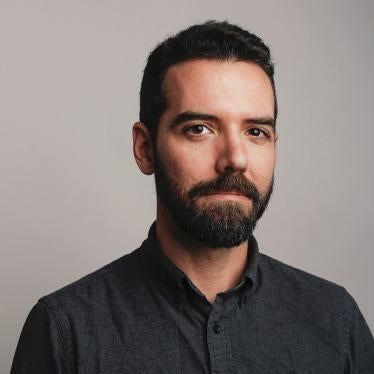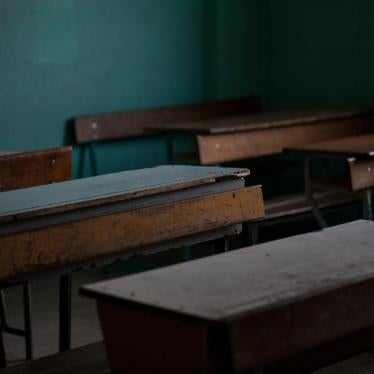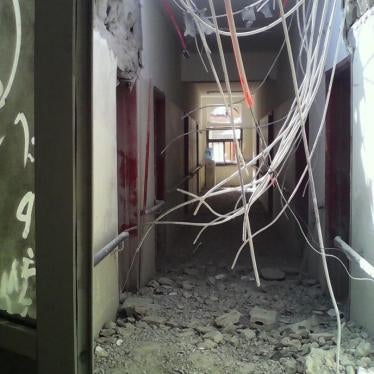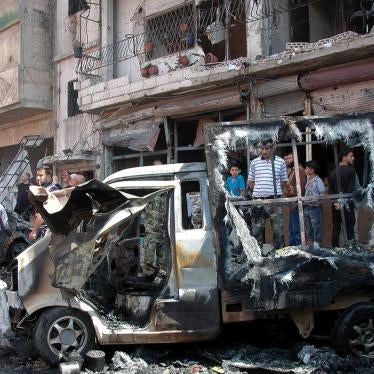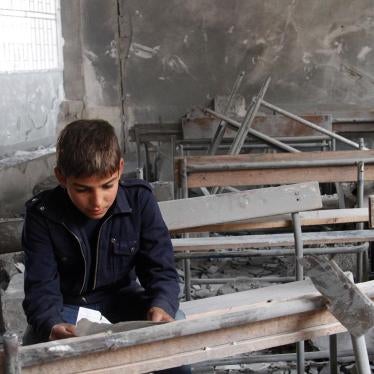Update: Ali’s father, Sa'ad Dawabshe, died on August 8, 2015, and his mother, Reham Dawabshe, died on September 7, 2015 from wounds they sustained in the arson attack. The sole survivor of the family is four-year-old Ahmed, who suffered second-degree burns on more than 60 percent of his body.
The death of an 18-month-old Palestinian toddler in an arson attack on 31 July was wrenching evidence of the dangers faced by Palestinian children. Some Israeli officials, like education minister Naftali Bennett, are pretending that the problem is just a “tiny group” of Jewish extremists who “represent nobody but themselves.” In fact, those extremists are enabled by Israel’s culture of impunity for settler violence, and abetted by Israel’s unlawful military policies. Palestinian kids are suffering the result.
Israeli leaders have promised to bring Ali Dawabshe’s killers to justice—echoing the promise they made last year after Israeli extremists burned to death 16-year-old Mohammed Abu Khdeir. Abu Khdeir’s killers are on trial, and a Jewish Israeli suspected of other violence is in administrative detention—the form of detention without charge or trial that Israel has inflicted on thousands of Palestinians.
Ali’s parents and his four-year-old brother, Ahmed, were severely burned. It was not the first time that Israeli settlers had attacked their village, Duma. Settlers have destroyed 350 olive trees in recent years. In December 2012, unidentified attackers set two trucks on fire and sprayed a sidewalk with a Hebrew phrase that named a settlement. Ali’s father, Saad, died of wounds from the attack on 8 August—the same day settlers reportedly again threw firebombs at another home in the village.
But Israeli leaders have announced no plans to fix the culture of impunity that emboldens Israeli civilians to attack Palestinians and Israeli soldiers to use excessive force against them. Because of that impunity, the Israeli rights group B’Tselem has said it is only “a matter of time” before more Palestinian children are killed.
Settlers attack Palestinians and their property on a near-daily basis—there were more than 300 such attacks last year, but few attackers faced justice. In the past decade, less than two percent of investigations into settler attacks ended with convictions, the rights group Yesh Din found. Attacks since 2009 for which the available evidence pointed to Jewish perpetrators but Israeli authorities failed to charge anyone include nine arson attacks on Palestinian homes, another on a family in a taxi, and dozens more on schools, mosques and churches. The annual number of attacks by settlers has nearly doubled since 2009.
Israeli security forces have failed to protect Palestinian communities like Duma that are at known risk of settler attacks and often stand idly by during the attacks.
The soldiers injure and kill far more Palestinians than settlers do, though. In 2014, Israeli forces wounded more than 1,200 Palestinian children in the West Bank, often firing live ammunition as crowd control, and killed thirteen children. In 2013, Israeli forces killed at least two children on or near school grounds. Yet only 2.4 percent of military investigations into alleged unlawful harm by soldiers to Palestinians of all ages lead to indictments.
Israel applies harsh military orders to Palestinian children and tries them in military courts—unlike settler children living in the same territory, who are subject to Israel’s civil laws and courts. Israeli forces arrest roughly 700 Palestinian children each year, including during nighttime arrest raids on their family homes. In most cases, the soldiers do not notify their parents of where they are holding the child. Ill-treatment of children detained by Israeli forces is “widespread, systematic, and institutionalized,” UNICEF has reported, and can include blindfolding and painful handcuffing with plastic ties; physical assault, verbal abuse, and threats; denial of access to water, food, toilet facilities, and medical care; and coerced confessions.
If charges are brought, the overwhelming majority of children are held withoutbail, often for months. And conviction rates for Palestinian adults and children are high—99.74 percent in 2010, when figures were last published.
The Israeli military also has repeatedly occupied and used Palestinian schools for military purposes, established firing zones in their vicinity, and issued demolition orders for schools for which Israeli officials had denied building permits. The US State Department reported more than 160 settler attacks or military operations that directly affected Palestinian schools, staff and students in the West Bank in 2013, according to UNICEF—yet earlier this year, the US reportedly pressured the UN to keep Israel off a list of countries that abuse children’s rights in conflict. And Israel’s discriminatory, pro-settlement policies put Palestinian economic activity at a disadvantage and push hundreds of Palestinian kids to undertake hazardous, badly paid work on Israeli settlements. Ali Dawabshe’s father, Saad, had worked in the settlements, a relative said.
Israel should ensure justice for the murders of Ali and Saad Dawabshe. But Israeli policies must fundamentally change if other Palestinian children in the West Bank are to have a future—to say nothing of the children in Gaza, who face appalling conditions from the devastation caused during last year’s hostilities and the grinding blockade imposed by Israel and Egypt.
